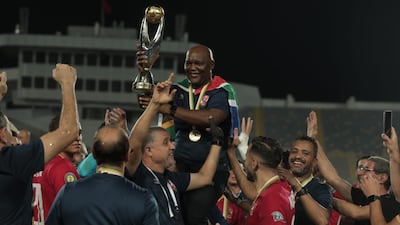A moment of history deserves more witnesses than were permitted at the Mohamed V Stadium in Casablanca at the weekend, and probably more of a tough contest too. But these are unusual times, and the compensation for Al Ahly, as they celebrated a landmark 10th African Champions Cup after comfortably defeating Kaizer Chiefs in the final, is that they can foresee their grip on the trophy lasting well into a future where supporters are again allowed into arenas in big numbers.
Champions Cup number 10, ‘El Ashra’, followed number nine very quickly, with the rejigged calendar meaning less than eight months passed between Al Ahly’s victory - also in a vacated stadium - over Zamalek in the 2020 final and Saturday’s 3-0 win over South Africa’s Chiefs.
In the immediate aftermath, Pitso Mosimane, Al Ahly’s head coach, pointed ahead to the next target, a strong placing at the end-of-year Fifa Club World Cup, where the Egyptian giants will now join Chelsea, European Cup holders, and the other respective continental champions.
“We beat the team from Conmebol [South America] there last year,” Mosimane pointed out, in one of his characteristic rallying cries for self-belief in African football. “Africa can stand up against the South Americans and we sometimes give the Europeans too much respect.”
Had there been no Covid-19 pandemic, this would have been the summer to truly test the global hierarchy of club football. It was to have been the launch date of an expanded version of the Club World Cup - 24 leading clubs, drawn from each continent, were to have lined up in China for what Fifa billed as the equivalent of a World Cup for the club game.
The global health crisis meant the event was postponed, but the concept remains on the sport’s agenda. It hopes to act as an antidote to the push for a Super League by some wealthy European clubs - the super-sized Club World Cup would bring in a new, regular income stream - and as a recognition that excellence in club football is not confined to Europe and South America. Since 2010, five of the finalists in the current Club World Cup format have come from either Africa, central America or Asia.
Plans to expand the Club World Cup are also an acknowledgement that while individual talent invariably migrates to the wealthy clubs of western Europe, it starts from far and wide. “Why are Sadio Mane and Mohamed Salah conquering the European Champions League?” asked Mosimane. “Africa has the resources.”
That includes coaching, Mosimane stressed: “Europeans are always coming to Africa to coach, but Africans can win things ourselves.” Mosimane styles himself as the proof. He is from South Africa - he grew up with an affection for Kaizer Chiefs - and he proudly displayed a South African flag after Al Ahly’s win over a Chiefs side who were down to 10 men for the entire second half in Casablanca.
His flag-waving both reminded his countrymen he still has them at heart, while showing he is confident that his Egyptian employers have enough faith in his commitment to them not to feel betrayed. Last year Mosimane became the first African coach from outside Egypt put in charge at Al Ahly. He now has three African Champions Cups to his name, the first with Mamelodi Sundowns in 2016.
Several of his Al Ahly players will quickly have another opportunity on the big stage, albeit without much on-site audience. Four of those who took apart Kaizer Chiefs in Saturday’s final are in Egypt’s Olympic Games squad, including Akram Tawfik, who had a lively final up and down the right flank, and, as one of the three permitted over-23 players, the goalkeeper Mohamed El Shenawy. They have little time to catch their breath. Egypt take on Spain, the Olympic favourites, on Thursday in Sapporo.
Olympic men’s football has a tradition of African excellence. In five of the last seven Games, an African country has medalled. Egypt, though disappointed that Salah was prevented from joining their bid to join that list by his club, Liverpool, have sent a strong squad. So have Ivory Coast, who have the blessing of Manchester United to field Eric Bailly and Amad Diallo.
South Africa, the third qualifier from Africa, are beset with problems. No sooner had the Kaizer Chiefs players, Reeve Frosler and Nkonsingiphile Ngcobo dusted themselves down from the crushing defeat by Al Ahly and set off for Tokyo than they learned two colleagues in the South Africa squad had tested positive for Covid-19, disrupting preparations for their tournament opening, a taxing fixture against the hosts, Japan.


